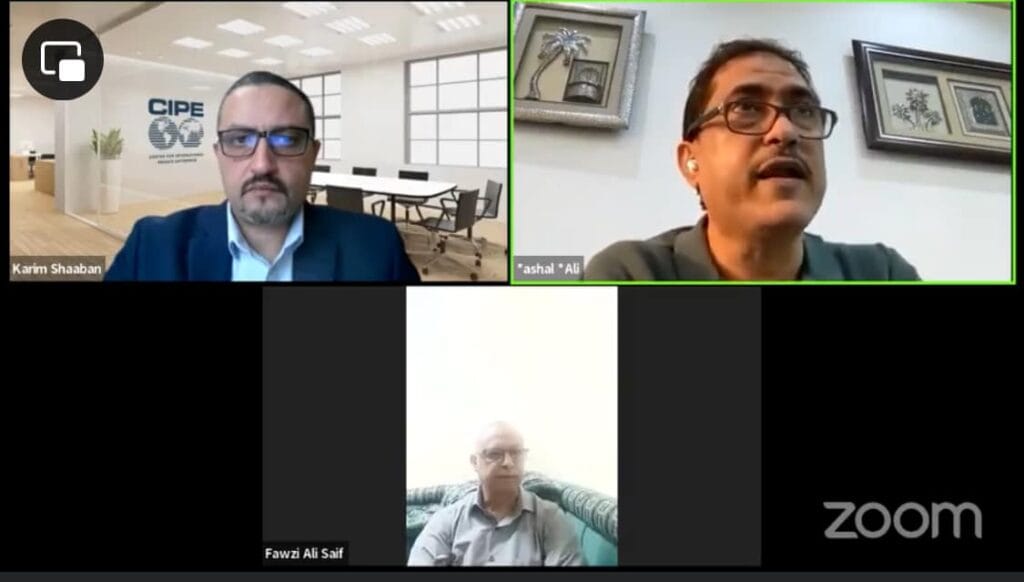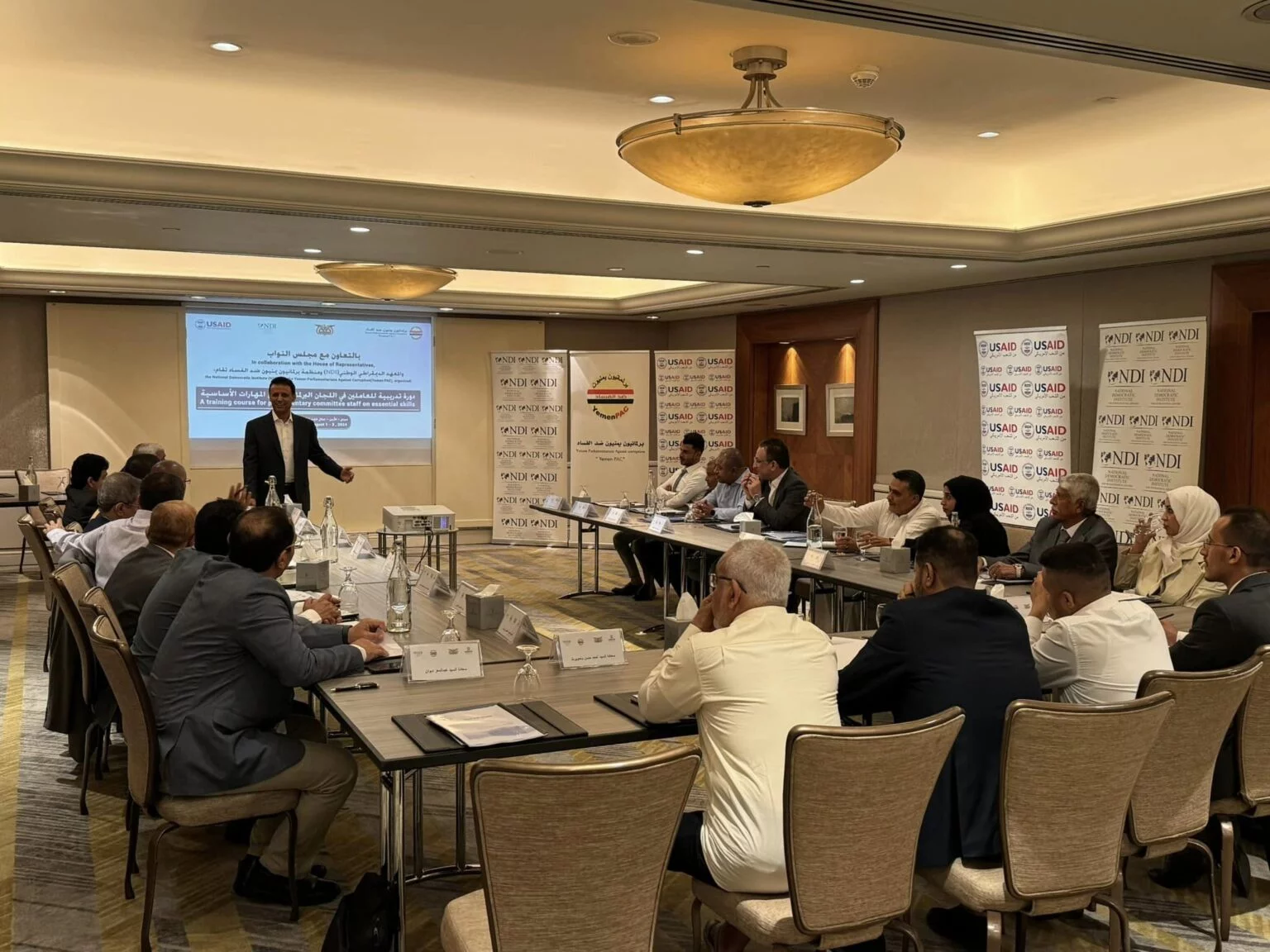A Webinar on Corruption, Conflict, and Priorities for the Next Phase

On International Anti-Corruption Day:
Yemeni and International Experts Stress the Need for Political Will and a Strategy Aligned with Current Priorities to Combat Corruption
In commemoration of International Anti-Corruption Day, the Yemeni Parliamentarians Against Corruption Organization (YemenPAC) and the Economic Media Center (SEMC) held a webinar on Saturday, December 9, 2023, focusing on “Corruption, Conflict, and Priorities for the Next Phase.”
The webinar, conducted via Zoom, was attended by approximately 60 participants, including members of the Yemeni Parliament, former ministers, representatives from various government agencies, international organizations, local institutions, journalists, and anti-corruption civil society activists.
The discussion addressed several key issues related to corruption in Yemen and the impact of the ongoing conflict, including the disruption of anti-corruption mechanisms and structures. The participants emphasized the challenges posed by the fragmentation of authorities and the absence of political will to effectively combat and mitigate corruption.

The President of YemenPAC, MP Sakhr Al-Wajeeh, expressed his satisfaction with the convening of the webinar, emphasizing that the complex and intertwined crises Yemen is experiencing have contributed to the spread and entrenchment of corruption in the absence of effective oversight from both the legislative authority and other regulatory bodies.
In his remarks, Al-Wajeeh referred to what he described as the deliberate disruption of the House of Representatives, which has convened only twice: the first in Sayun to elect a new council bureau, and the second in Aden for the swearing-in of the Presidential Leadership Council. After that, the council has been entirely inactive, except for limited oversight activities by special committees investigating specific issues.
Al-Wajeeh added, “The term of the Supreme National Authority for Combating Corruption and the Supreme Committee for Tenders has ended, and no decisions have been made to reconstitute them. Meanwhile, the Central Organization for Control and Auditing continues to issue its reports, but they fall on deaf ears with the Presidential Leadership Council or the government.”

The discussion then moved to Arkan Al-Sablani, Senior Technical Advisor and Director of the Regional Project on Anti-Corruption and Integrity in Arab Countries at the UNDP. His remarks focused on enforcement and follow-up mechanisms for international anti-corruption agreements.
Al-Sablani emphasized the global relevance of the webinar’s topic, particularly the relationship between corruption and conflict. He added that anti-corruption systems should not be limited to the United Nations alone, as there are other systems dedicated to combating corruption. He highlighted that the UN Convention against Corruption (UNCAC) is complemented by regional counterparts, such as the Arab and African conventions.
In his address, Al-Sablani explained that anti-corruption systems are built on several components. The first is international treaties, the second is recommendations, which often carry a quasi-mandatory nature and sometimes lead to sanctions, such as those issued by financial action organizations. The third component is national laws, often referred to as “long-arm laws,” which, although national, have international dimensions and significant cross-border impact. The fourth component is indicators, which provide a foundation for decisions and the formulation of sanctions with economic implications.
Kareem Shaaban, Director of the Center for International Private Enterprise (CIPE) in Jordan, provided an analysis of the current state and mechanisms of anti-corruption efforts in Yemen, based on a recent study. He highlighted key legal and constitutional gaps, such as the lack of constitutional provisions emphasizing transparency. On the contrary, certain laws, such as the Law on the Trial of Senior Officials, hinder transparency.
Shaaban outlined the causes of corruption’s entrenchment, including vested interests tied to senior military leaders, limited independence of oversight and anti-corruption bodies, the absence of good governance principles, and a lack of transparency and disclosure. He also pointed to the lack of whistleblower and witness protection, insufficient expertise and tools for combating corruption, the absence of performance indicators and standards, the paralysis of the Supreme Committee for Tenders and Auctions, and the overall dysfunction of accountability systems. Additionally, he noted that conflict and the duality of governmental institutions have further exacerbated the spread of corruption in Yemen.
Dr. Saad Al-Din Bin Taleb, former Minister of Industry and Trade and a member of Yemen’s first Anti-Corruption Authority, also spoke on the relationship between conflict, crises, and corruption, as well as mechanisms to combat corruption in the future. He focused on the current challenges facing the country, stating that Yemen lacks even the minimum level of political will required to confront and fight corruption effectively.

Dr. Bin Taleb, a strategic expert in anti-corruption, added that Yemen possesses a sufficient legal and legislative framework to confront corruption, including the necessary structures and institutions to eradicate and contain it. However, these efforts are hindered by the weak political will from the highest levels of the state to take action. This has led to widespread corruption across all institutions, from the top down, a lamentable state that was unforeseen, according to his remarks.
Dr. Bin Taleb emphasized the urgent need to activate political will to halt the systemic corruption that is eroding institutions, threatening social stability, and worsening the already dire economic situation, which has reached its lowest point ever.
Ali Ashaal, a member of the Yemeni Parliament and recipient of the Anti-Corruption Award from the Global Organization of Parliamentarians Against Corruption, discussed the role of official oversight institutions in combating corruption. He highlighted the total paralysis these institutions are experiencing, which has encouraged the spread of corruption throughout the state apparatus. He also pointed to the Yemeni Parliament’s complete suspension of its oversight and accountability functions under the pretext of the exceptional circumstances the country is facing.
Ashaal argued that the inactivity of oversight institutions has emboldened corrupt individuals, allowing them to operate with impunity. He noted that some have even refused to cooperate with parliamentary inquiries, including ignoring requests for responses to questions raised by MPs about various abuses that perpetuate corruption. He acknowledged that the task of fighting corruption is challenging due to staunch resistance from those who should be leading the fight.
Mustafa Nasr, President of the Economic Media Center, focused on the importance of forming alliances and networks between civil society organizations, the media, and the private sector to combat corruption. Nasr stressed that this collaboration is crucial, especially given the collapse of institutions tasked with combating corruption. He also noted a decline in public and media efforts to fight corruption and the exclusion of civil society from any initiatives aimed at confronting it. Nasr called for reviving the Civil Coalition Against Corruption, previously supported by the World Bank, as a critical step forward.

The webinar concluded with several key recommendations, including:
- Stimulating political will through various means to directly assess the state of corruption, followed by the development of a new, realistic, and implementable anti-corruption strategy in partnership with all stakeholders.
- Focusing on local levels by supporting and reviving the role of local institutions.
- Reviving and re-establishing the Civil Coalition Against Corruption, which was previously supported by the World Bank.
- Initiating efforts to assess the corruption system and laying the groundwork for a phased action plan to guide anti-corruption efforts.
- Prioritizing sector-specific anti-corruption initiatives and focusing on efforts that contribute directly to combating corruption, such as promoting transparency and good governance, which can serve as foundational inputs without provoking opposition. These steps aim to encourage government engagement with such efforts.
- Building an integrity system from the grassroots level, starting with local communities.
- Forming a committee comprising governmental and non-governmental entities to monitor and track corruption practices carried out by Houthi coup forces across all institutions under their control.
The webinar also featured several main contributions from representatives of government entities such as the Central Organization for Control and Auditing, the First Public Prosecutor of the Republic, and the Ministry of Planning and International Cooperation. Additional contributions from participants enriched the discussion, addressing the current state of anti-corruption efforts in Yemen and the mechanisms that could be employed to combat the infiltration and spread of corruption in official institutions.

